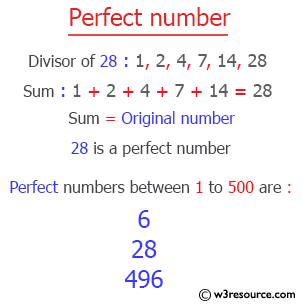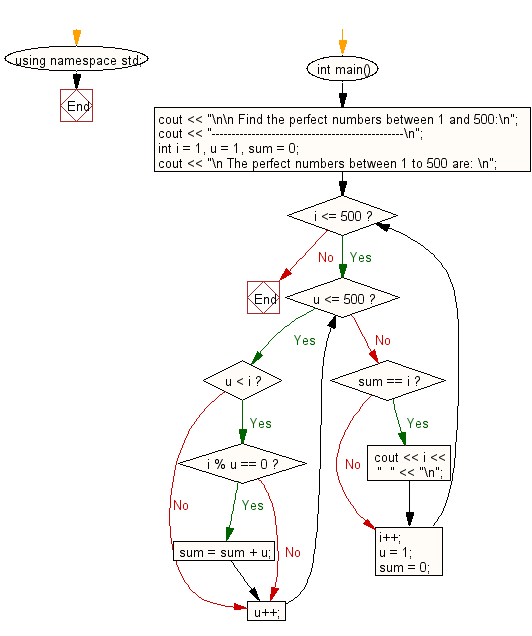C++ Exercises: Find the perfect numbers between 1 and 500
4. Find Perfect Numbers Between 1 and 500
Write a program in C++ to find the perfect numbers between 1 and 500.
Visual Presentation:

Sample Solution :-
C++ Code :
#include <iostream> // Preprocessor directive to include the input/output stream header file
using namespace std; // Using the standard namespace to avoid writing std::
int main() // Start of the main function
{
cout << "\n\n Find the perfect numbers between 1 and 500:\n"; // Display a message indicating the purpose
cout << "------------------------------------------------\n"; // Display a separator line
int i = 1, u = 1, sum = 0; // Declare and initialize integer variables 'i', 'u', and 'sum'
cout << "\n The perfect numbers between 1 to 500 are: \n"; // Display a message indicating the list of perfect numbers
while (i <= 500) // Start of the outer while loop to iterate through numbers from 1 to 500
{
while (u <= 500) // Start of the inner while loop to check divisors of 'i'
{
if (u < i) // Condition to check if 'u' is a proper divisor of 'i'
{
if (i % u == 0) // Check if 'u' is a divisor of 'i'
sum = sum + u; // If 'u' is a divisor of 'i', add 'u' to 'sum'
}
u++; // Increment 'u' for checking the next divisor
}
if (sum == i) // Check if the sum of divisors 'sum' is equal to 'i'
{
cout << i << " " << "\n"; // If 'sum' is equal to 'i', then 'i' is a perfect number, so print 'i'
}
i++; // Move to the next number to check if it's perfect
u = 1; // Reset 'u' to 1 for the next iteration
sum = 0; // Reset 'sum' to 0 for the next iteration
}
}
Sample Output:
Find the perfect numbers between 1 and 500:
------------------------------------------------
The perfect numbers between 1 to 500 are:
6
28
496
Flowchart:

For more Practice: Solve these Related Problems:
- Write a C++ program to identify all perfect numbers between 1 and 1000.
- Write a C++ program to check each number in a range for perfection by summing its proper divisors.
- Write a C++ program to display perfect numbers in a given range and count how many exist.
- Write a C++ program to list all perfect numbers between 1 and n, where n is input by the user.
Go to:
PREV : Display n Terms of Natural Numbers and Their Sum.
NEXT : Check Whether a Number is Prime or Not.
C++ Code Editor:
Contribute your code and comments through Disqus.
What is the difficulty level of this exercise?
